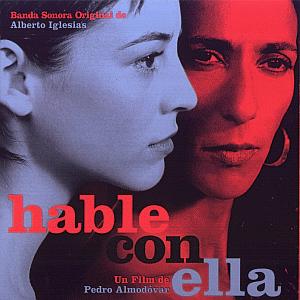Alberto IGLESIAS
Hable Con Ella
MILAN 74321 92849-2 [63:33]

Iglesias has scored a number of Almodovar's films, notably All About My Mother and Live Flesh. This latest collaboration instead of being about women from the perspective of women, is about women from those who admire and lust from afar - Men.
His score here is generally sombre, melancholy and subdued. Not enough so as to be depressing, merely a tonal consistency to be mentioned. What that says about Man's feelings towards Women is up to the film to clarify! The very brief "Sabana Santa" introduces this, but we're then made to wait for its return due to a little higgledy-piggledy sequencing placing contrasting source cues in between. First is the title song "Hable Con Ella" with one of the only appearance of Spanish guitar. This is performed by its co-writer Vincente Amigo, whom the booklet credits as responsible for the film's final cue. As track number 2, it's clearly out of place.
So too is "Cucurrucucú Paloma" which follows with its 'aye-aye-aye-aye-aye-aye' softly-softly singing by Caetano Veloso. Later there's the song "Por toda A Minha Vida" by Ellis Regina, but thankfully the final 2 source pieces are left to the end. "Raquel" by Bau features the only use of percussion on the whole album (alongside guitar). Then "The Plaint: O Let Me Weep" by Purcell from his Fairy Queen is a gorgeous duet for soprano and harpsichord. Neither would have belonged anywhere else on the disc.
There are several 1 to 2 minute cues that do very little and add very little. In fact, there might have been a better solution in sequencing a few into suites. Ultimately the 63-minute running length feels a little padded out by their individual inclusion.
But in returning to Iglesias's work, there's much to enjoy. After the jolly opening 2 source songs, "El Grito" is a very unexpected downturn in mood. Its beginning is somewhat similar to the soundscapes favoured by Angelo Badalamenti in his David Lynch projects, but then it's saved by a surge upwards via strings. These soundscapes of manipulated tension also appear in "La Noche Y El Viento" and "La Discusión Viaja En Coche" with its mysterious hollow intonations.
Elsewhere the aforementioned melancholy pervades "La Mesita De Noche", and the longest cue "El Amante Menguante" (8:28), which is a real showcase for the ensemble's string section. It has a very strong solo on cello that's contrasted nicely later by the lovely piano solo in "Alica Vive". Two cues change pace very slightly, picking up urgently ("Jordania" and "A Portagayola") on strings. The writing is a little reminiscent of Patrick Doyle's Henry V, but I'm sure it's purely coincidental.
The director's comments in the booklet are a little obscure (music as "a porous cashmere blanket"), but even if the language loses something in the translation, Iglesias's music certainly doesn't.
Paul Tonks

Return to Index